James Herrera, Program Coordinator, DLC-SAVA Conservation
Education is crucial for the growth and development of individuals, communities, and societies. Education is not restricted to children in the classroom. In conservation, education is a pillar necessary for sustainable development and increasing awareness and compassion for nature. Baba Dioum, the famous Senegalese conservationist, once said, “We will conserve only what we love, we will love only what we understand, and we will understand only what we were taught.” It is, therefore, crucial to integrate education into any conservation action planning.
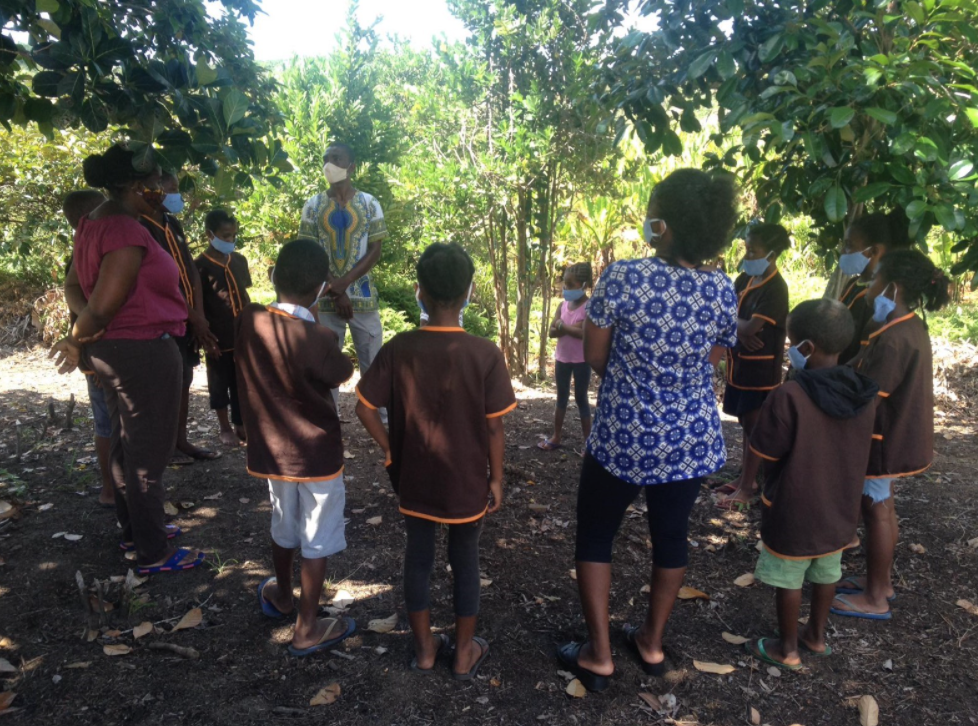
Getting kids out in nature is critical to experiencing the value of the environment. Here Evrard Benasoavina takes students for a tour of his garden where he has planted diverse fruit trees and is restoring native forest too. He explains how the forest he is growing gives us food, but also provides shade and combats climate change locally and globally.
At the DLC, we have been conducting conservation programming in Madagascar for over 30 years. In the last 10 years, we have developed the SAVA Conservation initiative, focused on the northeast SAVA region. The DLC drew from the experience of conservation educators in other parts of Madagascar [1,2], as well as classic examples of grass-roots conservation action such as the Jane Goodall Institute [3]. These experiences led us to design and support several different education missions to advance the preservation of nature in Madagascar. First, through workshops with diverse voices and local educators, we have trained teachers to implement environmental education into their basic curricula. Second, we host school visits to natural areas and environmental interpretive centers to give kids a chance to experience nature and learn first-hand about the value of biodiversity.
Since 2011, DLC has supported workshops to train teachers how to integrate the basics of environmental sciences into their primary school curricula. First, the DLC staff liaised with educators and conservationists as well as administrators in the Ministry of Education to design a manual to instruct teachers on the methods of implementing the environmental coursework. Then, the school administrators designed a plan to train all the teachers in all the primary schools of two out of the four districts of SAVA, Sambava, and Andapa. By 2021, we have hosted over 19 workshops for all the primary school teachers in the two districts. Over 2,600 teachers were trained in environmental education. They received the manual as well as other pedagogical materials to help them implement the materials they learned. Now, we are planning follow-up surveys with the teachers to determine the efficacy of implementing the material in their curricula and how we can improve the training for the next district, Antalaha.
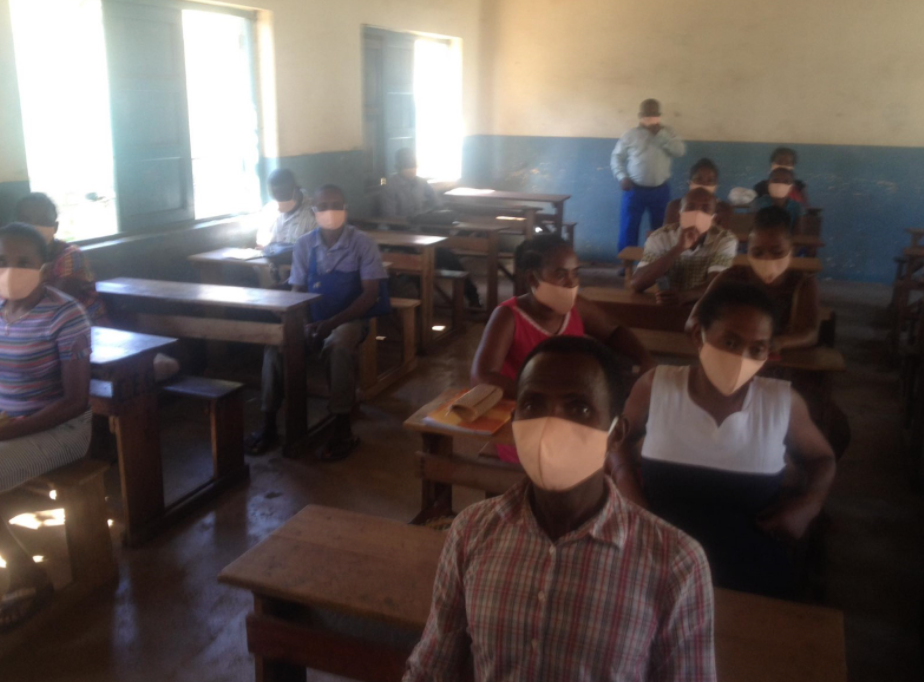
260 teachers participated in the 2020 Teacher Training Workshop in Sambava. Though there are very few known cases of COVID-19 in SAVA, and Madagascar generally, DLC staff took all possible precautions, providing masks for all participants, handwashing stations, restricting class sizes to allow physical distancing, and having nurses present throughout every day of the workshop to monitor symptoms and share information about the virus. The workshop marked the completion of training for all schools in the Sambava and Andapa districts, over 2,600 teachers. Now we will plan for the next district, Antalaha.
Learning about nature in books works for some students, but for many, being in nature is the best way to connect and create a lasting and life-changing memory. Children in Madagascar seldom have opportunities to visit natural areas for education for several reasons. First, much of the forest in Madagascar has been lost or degraded, and land around villages and towns is sparsely covered in little natural vegetation. Second, kids have a lot of responsibilities at home. They help care for their siblings, gather firewood and water, help on the farm, clean clothes and kitchenware, and if they are lucky, they do all this on top of 5-6 hours of class every day. Unfortunately, many children do not have the opportunity to go to school, either because the schools are too far, too expensive, or there is too much to do at home. At DLC, we have partnered with multiple institutions to give kids opportunities to experience nature first-hand, including guided tours at the Macolline Private Nature Reserve and Marojejy National Park [4]. Here we want to focus on a new venture in our Environmental Education kit.
Since 2019, we have partnered with an educational entrepreneur, Evrard Benasoavina. As an ecotourist guide and biodiversity researcher, Evrard knows the value of the natural environment as well as sharing that value with the broader public. After years of working with a research team and saving his money, Evrard bought a piece of land not far from the main city of Sambava. The land was modest at first, but Evrard has worked hard to plant dozens of species of plants, including over 12 species of fruiting trees and trees that are native to Madagascar. With the support of his research group from Germany and the generous donations from people around the world, Evrard built a classroom and a kitchen on his land, which he calls the New Generation School Garden [5]. His goal is to host visits by school children and lead hands-on active learning programs combined with classroom-style discussions about the value of nature.
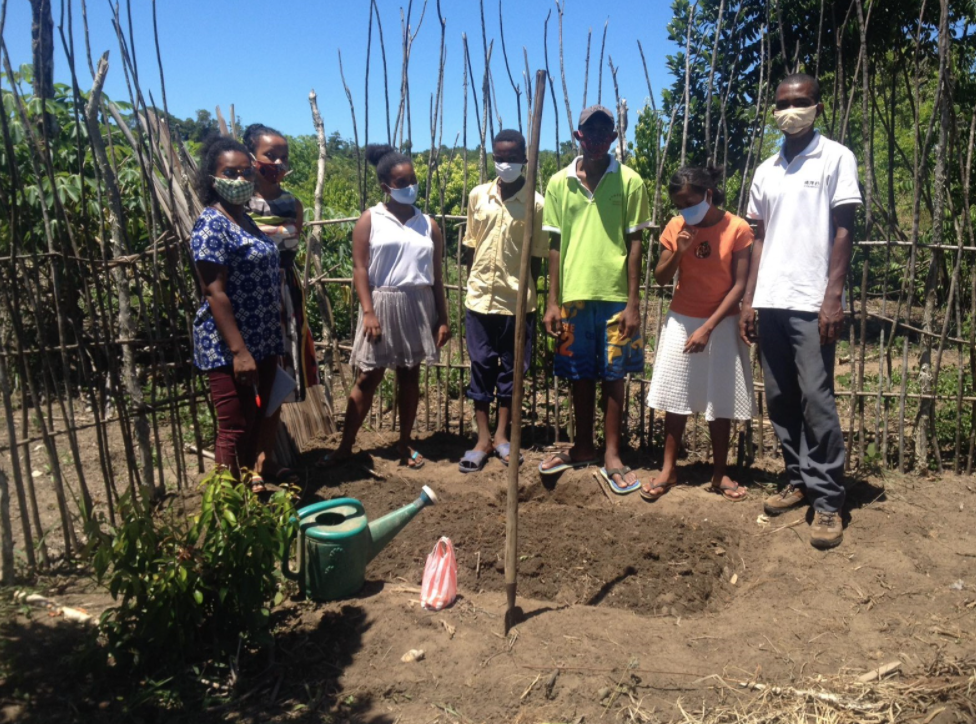
Evrard (far right) and his teaching assistant Marie Olys (far left) after teaching students about making an organic garden with local compost.
DLC has assisted by providing materials for the center, including educational posters written in the local dialect about sustainable agriculture, biodiversity of SAVA region, and more. Evrard also participates in a DLC-sponsored Environmental Education Working Group, which is co-creating and now piloting new pedagogical approaches that are being designed by the group. Each school group will have three guided tours of the School Garden, with each lesson building on the previous one. The first visit focuses on Principles in Environmental Sciences, the second on Biodiversity and the Web of Life, and the last on People and Sustainable Use of the Environment. All the lessons integrate principles of agroecology to illustrate nature-based solutions to common challenges in the environment and agriculture.
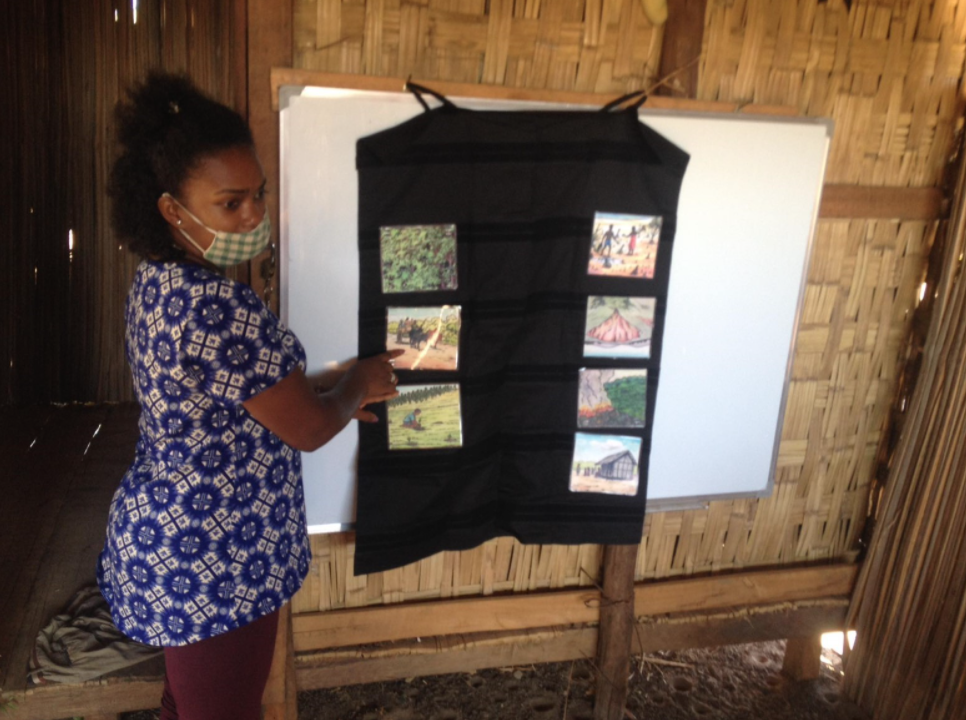
Evrard and his assistant, Marie Olys, use the Kit Mad’Ere, a visual aid used to teach about nature and draw comparisons between sustainable and unsustainable use of the environment. DLC has led training in the use of Kit Mad’Ere, and now another education partner, Macolline is also teaching workshops with the kit [6].
The children receive notebooks, coloring books, pencils, and crayons to use during their visits. Evrard uses nature journaling as a way to help kids connect with the material. Rather than only taking written notes, the children are guided to draw about the concepts taught during the visits in their own way. They draw the trees and animals they like best during their visit and write notes about how their experience in nature made them feel. Instead of giving the kids a quiz with right and wrong answers, their nature journals are used to evaluate their learning experience. The kids also plant fruit trees around the land, and create garden beds amended with locally-made compost and planted with crops that invigorate the soil, instead of degrading it. They pick fresh fruits and vegetables from the garden and have a nutritious picnic lunch on site. Evrard is planning on hosting three visits for each school group at each of 6 schools during 2021. Evrard and his team have already raised €2,000 through donations and DLC is assisting to raise the funds needed to bring children to the New Generation School Garden.
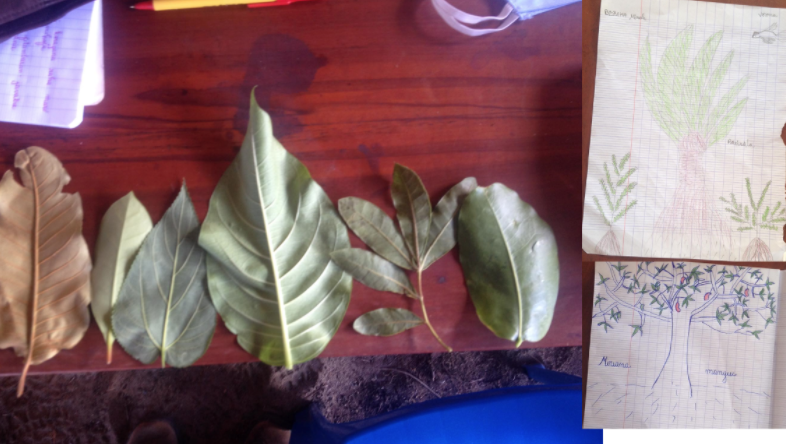
Using nature journaling as an educational tool for children to connect with nature in their own way. Here, students drew different leaf forms in their notebooks and wrote about how leaf form differs among tree species. On the right, they draw their favorite trees, including the Ravinala (top right), which is the national tree of Madagascar, as well as the fruits like mango (bottom right).
Without effective education, people cannot grow their lives. Education doesn’t stop after leaving school and of course, adults can learn new things every day. Throughout all our programs, education is a fundamental element that is crucial to achieving the Sustainable Development Goals for the future. As in all our programs, our support comes exclusively from grants and donations. If you are interested in making a tax-deductible donation to support these activities, consider giving to the Madagascar Programs and specify Environmental Education. We are especially grateful to our donors who make this work possible, including the Cooke family who generously supported the work described here.
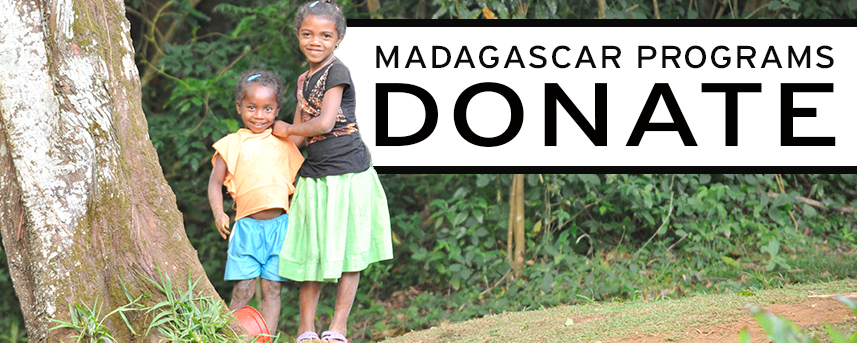
[1] https://en.wikiversity.org/wiki/Environmental_Education_Activities_Madagascar
[2] https://www.mdpi.com/2071-1050/11/11/3148
[3] https://www.janegoodall.org/uncategorized/environmental-learning-2/
[4] https://lemur.duke.edu/protect/sava-conservation/education-and-environment/
[5] https://schoolgarden418092668.wordpress.com/
[6] https://jhafund.com/2020/11/21/partnering-to-expand-environmental-protection-education-in-the-sava/

